Unit 5 Amazing things Revision复习课件(共有PPT26张)
文档属性
| 名称 | Unit 5 Amazing things Revision复习课件(共有PPT26张) |
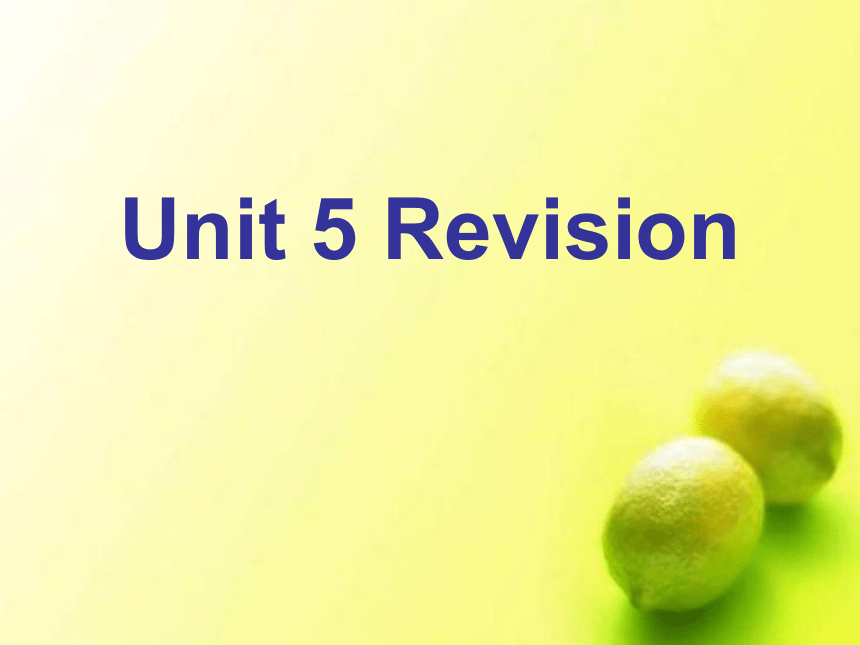
|
|
| 格式 | zip | ||
| 文件大小 | 303.1KB | ||
| 资源类型 | 教案 | ||
| 版本资源 | 牛津译林版 | ||
| 科目 | 英语 | ||
| 更新时间 | 2022-05-03 08:02:44 | ||
图片预览

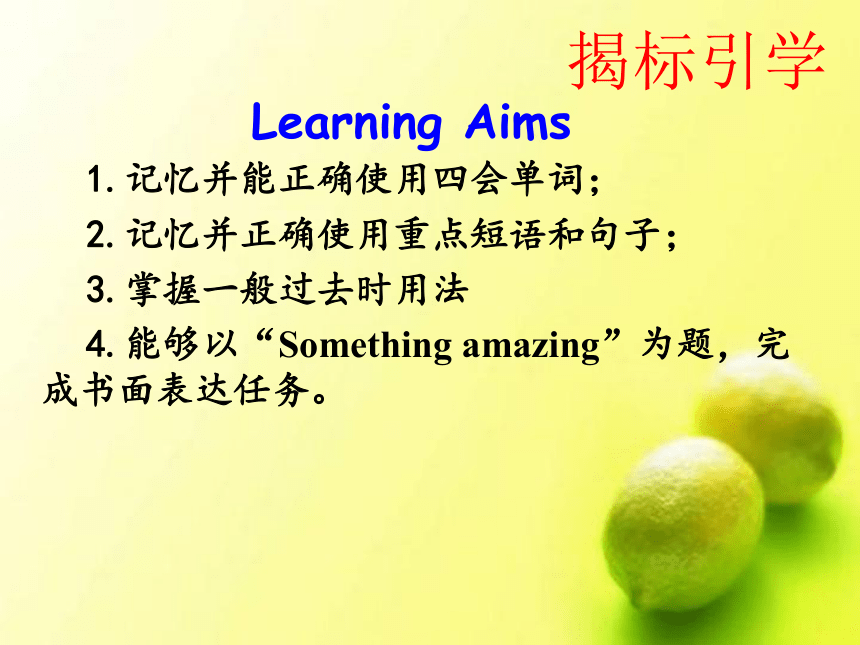
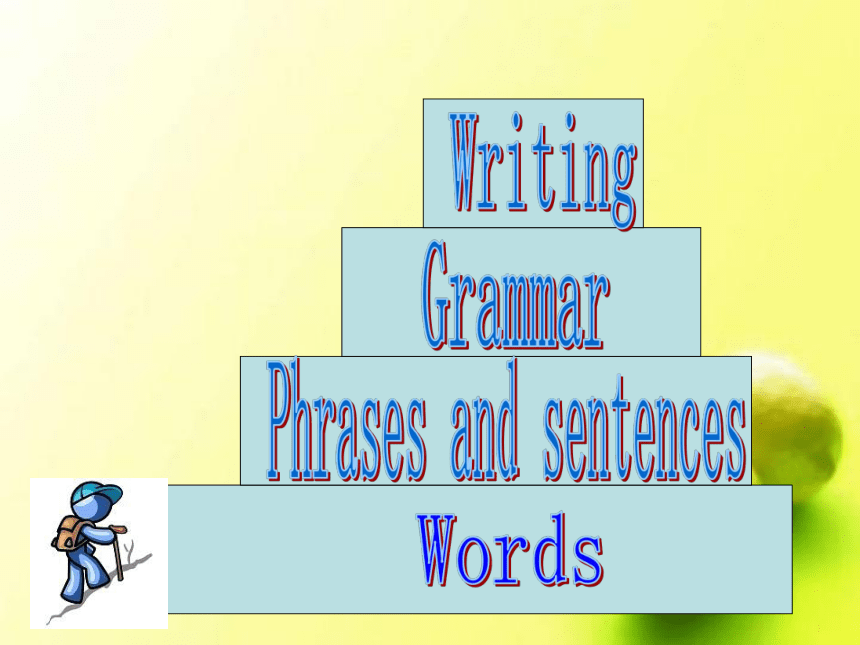
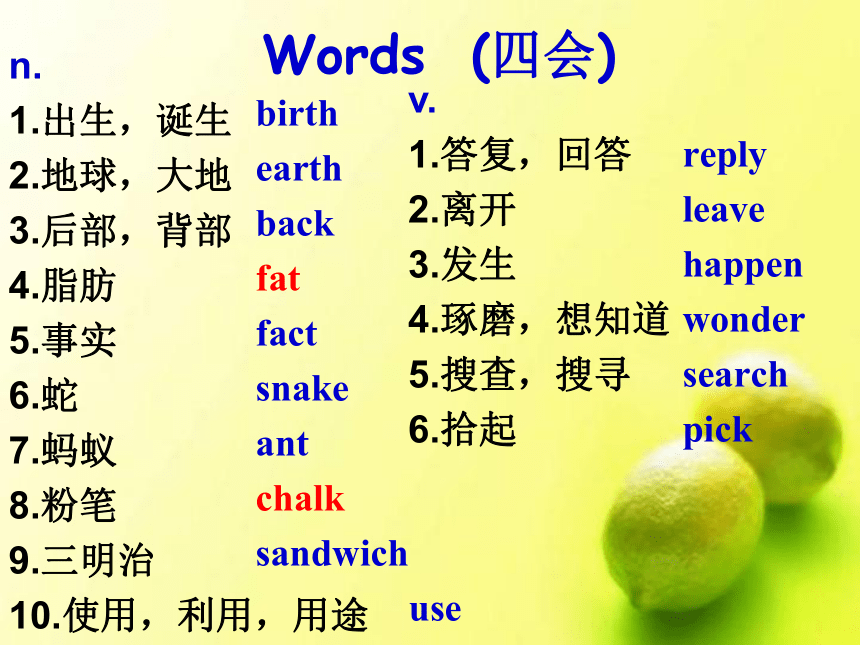
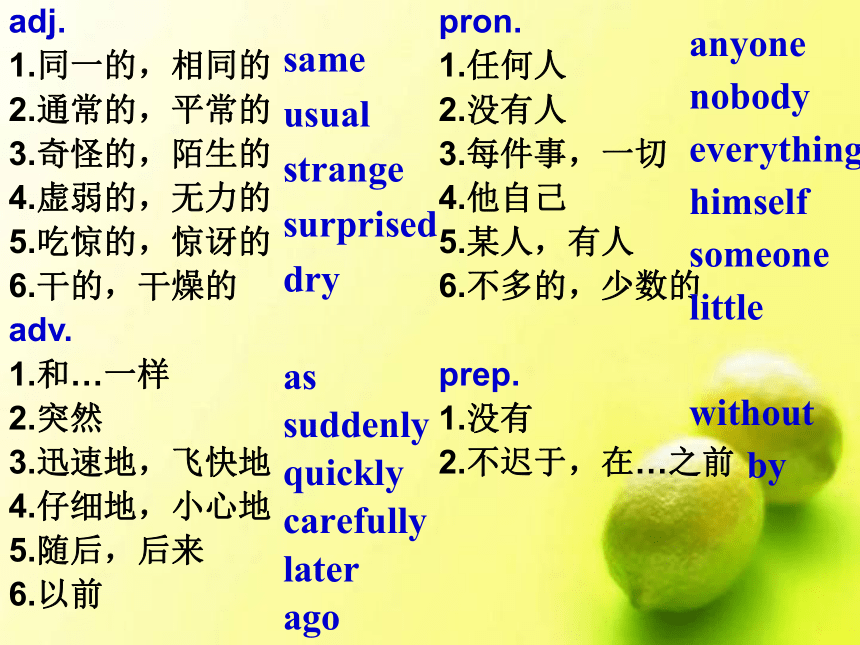
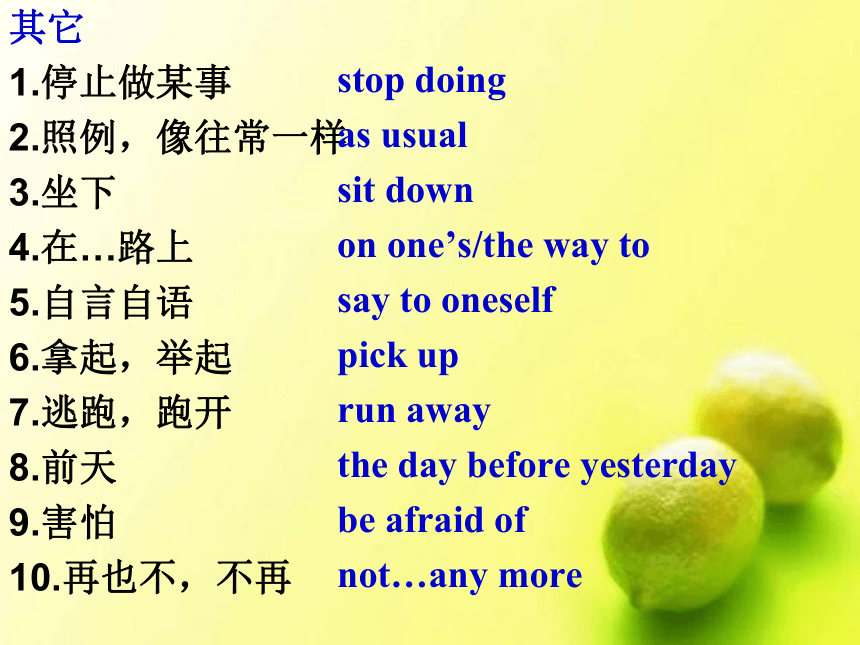
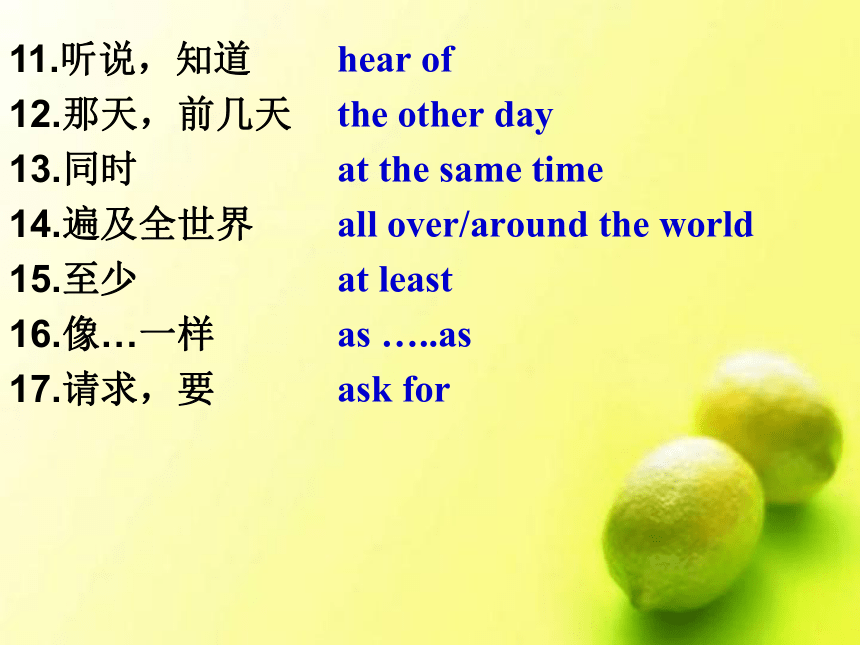
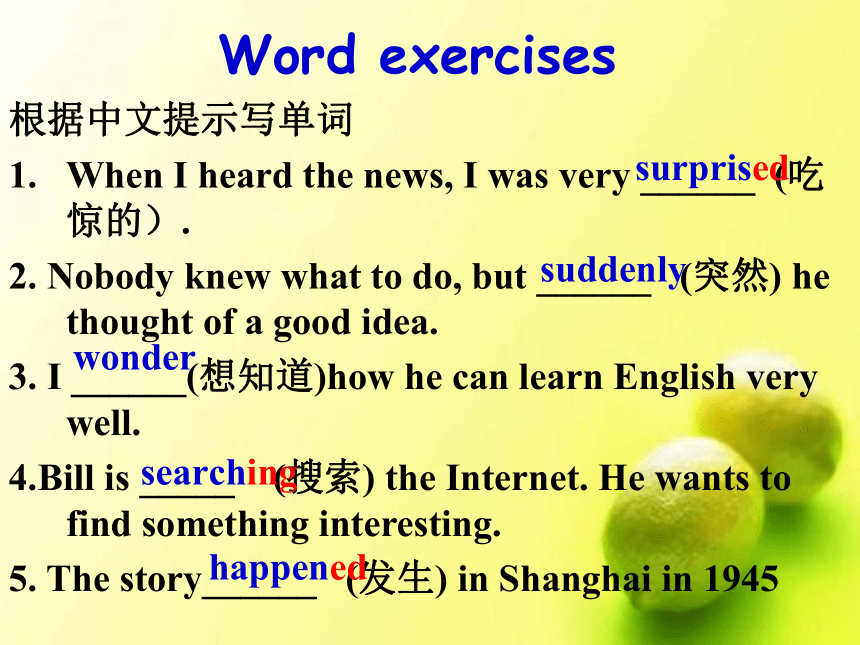
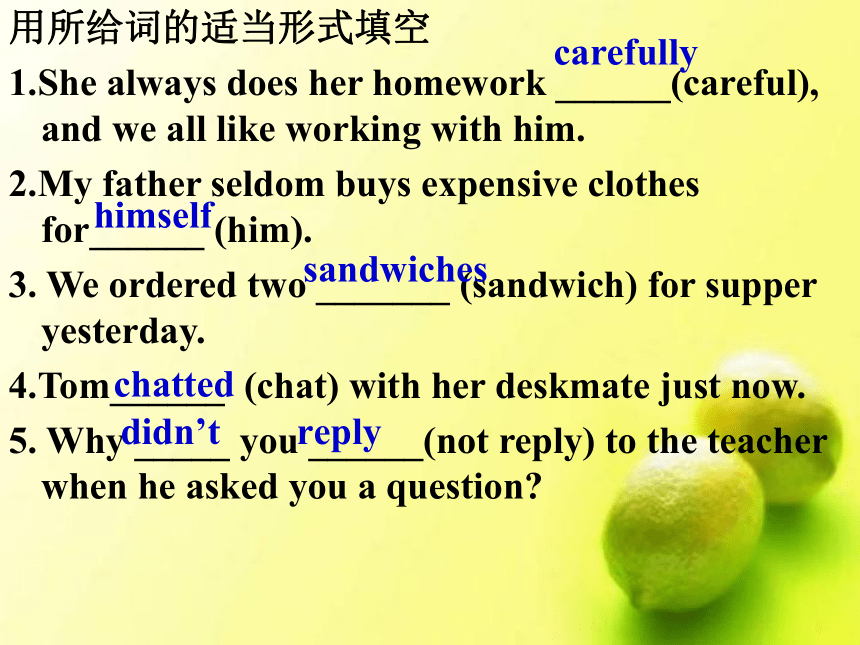
文档简介
(共26张PPT)
Unit 5 Revision
Learning Aims
1.记忆并能正确使用四会单词;
2.记忆并正确使用重点短语和句子;
3.掌握一般过去时用法
4.能够以“Something amazing”为题,完成书面表达任务。
揭标引学
Writing
Phrases and sentences
Grammar
Words
Words (四会)
n.
1.出生,诞生
2.地球,大地
3.后部,背部
4.脂肪
5.事实
6.蛇
7.蚂蚁
8.粉笔
9.三明治
10.使用,利用,用途
v.
1.答复,回答
2.离开
3.发生
4.琢磨,想知道
5.搜查,搜寻
6.拾起
birth
earth
back
fat
fact
snake
ant
chalk
sandwich
use
reply
leave
happen
wonder
search
pick
adj.
1.同一的,相同的
2.通常的,平常的
3.奇怪的,陌生的
4.虚弱的,无力的
5.吃惊的,惊讶的
6.干的,干燥的
adv.
1.和…一样
2.突然
3.迅速地,飞快地
4.仔细地,小心地
5.随后,后来
6.以前
pron.
1.任何人
2.没有人
3.每件事,一切
4.他自己
5.某人,有人
6.不多的,少数的
prep.
1.没有
2.不迟于,在…之前
same
usual
strange
surprised
dry
as
suddenly
quickly
carefully
later
ago
anyone
nobody
everything
himself
someone
little
without
by
其它
1.停止做某事
2.照例,像往常一样
3.坐下
4.在…路上
5.自言自语
6.拿起,举起
7.逃跑,跑开
8.前天
9.害怕
10.再也不,不再
stop doing
as usual
sit down
on one’s/the way to
say to oneself
pick up
run away
the day before yesterday
be afraid of
not…any more
11.听说,知道
12.那天,前几天
13.同时
14.遍及全世界
15.至少
16.像…一样
17.请求,要
hear of
the other day
at the same time
all over/around the world
at least
as …..as
ask for
Word exercises
根据中文提示写单词
When I heard the news, I was very ______ (吃惊的).
2. Nobody knew what to do, but ______ (突然) he thought of a good idea.
3. I ______(想知道)how he can learn English very well.
4.Bill is _____ (搜索) the Internet. He wants to find something interesting.
5. The story______ (发生) in Shanghai in 1945
surprised
suddenly
wonder
searching
happened
用所给词的适当形式填空
1.She always does her homework ______(careful), and we all like working with him.
2.My father seldom buys expensive clothes for______ (him).
3. We ordered two _______ (sandwich) for supper yesterday.
4.Tom______ (chat) with her deskmate just now.
5. Why _____ you ______(not reply) to the teacher when he asked you a question
carefully
himself
sandwiches
chatted
didn’t reply
《课课练》P115 四
Phrases and Sentences
1.得了吧,加油 10. 搜索灌木丛
2.从出生起 11.听起来像
3.在大象的脚背里 12.那天的晚些时候
4.一个星期天早晨 13.生活在地球上
5.在大树下坐下 14.很久以前
6.从灌木丛传来低语声 15.嗅觉好
7.转过身 16.了解更多
8.在他们回家途中 17.打牌
9.把一切告诉某人 18.停下来吃饭
search the bushes
sound like
later that day
live on the earth
a long time ago
smell things well
play cards
know/learn more about
stop for /to have meals
come on
from birth
in the back of elephants’ feet
one Sunday morning
sit under a big tree
hear a whisper from the bushes
on their way home
turn around
tell somebody everything
19.两片面包 28.多月不吃或吃的少
20.在使用中 29.没有水能活许久
21.得名于 30.保持屋子干净
22.有趣的事实 31.环游80多个国家
23.一个不同寻常的事 32.用粉笔画画
24.仔细听 33.把他们捡起来
25.拍许多照片 34.变得流行
26.回到学校 35.与…一样大
27.住在陆地,树上或水里 36.把肉放在两块面包中间
two pieces of bread
in use
get the name from
an unusual thing
listen carefully
take many photos
live on the ground,in trees or in water
go/come back to school
eat little or nothing for months
live without water for a long time
keep the house clean
draw with chalk
pick them up
become popular
put meat between two
pieces of bread
the same size as/ as big as
fun facts
travel around over 80 countries
1.不过是一架飞机罢了。我昨天还看见一架。
2.鱼睁着眼睛睡觉。
3.太阳的体积比地球大三倍。
4.在回家的路上,她们遇见了安迪。
5.现在我再也不会害怕动物了。
1.It is just a plane. I saw one yesterday.
2.Fish sleep with their eyes open.
3.The Sun is three times larger than the Earth.
4.They met Andy on their way home.
5.I am not afraid of animals any more.
6.大象的脚背没有骨头,只有脂肪。
7.我们的眼睛从出生开始就一样大,但是鼻子和眼睛从未停止生长。
8.我对长颈鹿脖子里有7个骨头很惊讶。
9.我们需要保持我们的屋子干净。
10.他能同时一个手写,另一个手画画。
6.There are no bones in the back of elephants’
feet—only fat.
7.Our eyes are the same size from birth, but our nose and ears never stop growing.
8.I was surprised that there are only seven bones in giraffes’ necks.
9.We need to keep our house clean.
10.He can write with one hand and draw with the other at the same time.
11.骆驼生活在非常干燥的地方。
12.蛇寒冬好几个月吃得很少或什么也不吃。
13.他不再怕蛇了。
14.1935年前,全世界仅有两千台电视投入使用。
15.(他)发生/出了什么事?
11.Camels live in very dry places.
12.Snakes eat little or nothing for months in cold winter.
13.He is not afraid of snakes any more.
14.There were only two thousand TVs in use
by 1935.
15.What happened to him
《课课练》P115 五
Grammar
Simple past tense
一,定义
二,结构
三,时间标志
四,动词过去式变化规则
Exercises
写出下列动词的过去式
1. think________ 2. begin_______
3. bring_______ 4. buy_________
5. come _______ 6. do _________
7. draw _______ 8. drink _______
9. drive _______ 10. eat ________
11. feel ________ 12. carry _______
13. find ________ 14. fly ________
15. get ______ 16. give ______
17. keep ______ 18. know ______
19. lie ______ 20. learn______
thought
brought
came
drew
drove
felt
found
got
kept
lay
began
bought
did
drank
ate
carried
flew
gave
knew
learnt/ learned
21. make _____ 22. meet _______
23. put ________ 24. read _______
25. ride _______ 26. run ________
27. say _______ 28. see _______
29. sing ______ 30. sleep _______
31. smell ______ 32. speak ______
33. spend ______ 34. stand ______
35. swim _______ 36. take _______
37. teach ______ 38. tell _______
39. wake ______ 40. wear_______
41. win ________ 42. write ________
made
put
rode
said
sang
smelt
spent
swam
taught
woke
won
met
read
ran
saw
slept
spoke
stood
took
told
wore
wrote
1. _______ (be) you born in Yancheng
2. He _____________ (not tell) me a lot about his trip to Shanghai last week.
3.— ______Tom ______ (hear) anything from the bushes
— No,he heard nothing.
4. We _________not see) anything yesterday.
5. She _______ (not be) at home last night.
二,用所给词的适当形式填空
Were
didn’t tell
Did
hear
didn’t see
wasn’t
6. Who_______ (take) my pen just now
7. He ________ (stop) ________(write) his letter and had a rest.
8. ______ you ______ (enjoy) living in Beijing when you _______ (be) there three years ago
9. I _________(be) afraid of ants when I ______(be) young.
took
stopped
Did
enjoy
was
was
writing
were
10. They _______ (say) nothing and ______(go) out after Jim replied.
11. He _______ (search) the room carefully two minutes ago and ______(find) nothing.
12.— Where______he ______ (sit) at the meeting
— He was next to me and we ______(talk).
13. Who ______you______(see) yesterday
said
went
searched
found
talked
did
did
sit
see
in 1926
the first TV show
by John Baird in
the UK
about 2,000
TVs in use
by 1935
TVs can be as
large as 152 inches
now
in China, in 1987, about
29 TVs per 100 families,
but now most families
have at least one TV
The story of TVs
Writing
We live in a wonderful world with a lot
of amazing things.
Many people like sandwiches, but do you
know anything about this kind of food
Sandwich got its name form a man called
John Montagu, the Fourth Earl of Sandwich.
The man loved playing cards with his friends
very much. He did not want to stop for meals,
so he put meat between two pieces of bread.
Soon others wanted to eat the same food, so
they asked for a “sandwich”.
Later the food became popular all over the
world. Isn’t that amazing
TVs
thing
The first TV show was in the UK in
1926. There were about 2,000 TVs in use by
1935. In China, there were about 29 TVs per
100 families in 1987. But now most families
have at least one TV. And now TVs can be
as large as 152 inches.
Now TVs
The story of TVs.
Thank you!
Unit 5 Revision
Learning Aims
1.记忆并能正确使用四会单词;
2.记忆并正确使用重点短语和句子;
3.掌握一般过去时用法
4.能够以“Something amazing”为题,完成书面表达任务。
揭标引学
Writing
Phrases and sentences
Grammar
Words
Words (四会)
n.
1.出生,诞生
2.地球,大地
3.后部,背部
4.脂肪
5.事实
6.蛇
7.蚂蚁
8.粉笔
9.三明治
10.使用,利用,用途
v.
1.答复,回答
2.离开
3.发生
4.琢磨,想知道
5.搜查,搜寻
6.拾起
birth
earth
back
fat
fact
snake
ant
chalk
sandwich
use
reply
leave
happen
wonder
search
pick
adj.
1.同一的,相同的
2.通常的,平常的
3.奇怪的,陌生的
4.虚弱的,无力的
5.吃惊的,惊讶的
6.干的,干燥的
adv.
1.和…一样
2.突然
3.迅速地,飞快地
4.仔细地,小心地
5.随后,后来
6.以前
pron.
1.任何人
2.没有人
3.每件事,一切
4.他自己
5.某人,有人
6.不多的,少数的
prep.
1.没有
2.不迟于,在…之前
same
usual
strange
surprised
dry
as
suddenly
quickly
carefully
later
ago
anyone
nobody
everything
himself
someone
little
without
by
其它
1.停止做某事
2.照例,像往常一样
3.坐下
4.在…路上
5.自言自语
6.拿起,举起
7.逃跑,跑开
8.前天
9.害怕
10.再也不,不再
stop doing
as usual
sit down
on one’s/the way to
say to oneself
pick up
run away
the day before yesterday
be afraid of
not…any more
11.听说,知道
12.那天,前几天
13.同时
14.遍及全世界
15.至少
16.像…一样
17.请求,要
hear of
the other day
at the same time
all over/around the world
at least
as …..as
ask for
Word exercises
根据中文提示写单词
When I heard the news, I was very ______ (吃惊的).
2. Nobody knew what to do, but ______ (突然) he thought of a good idea.
3. I ______(想知道)how he can learn English very well.
4.Bill is _____ (搜索) the Internet. He wants to find something interesting.
5. The story______ (发生) in Shanghai in 1945
surprised
suddenly
wonder
searching
happened
用所给词的适当形式填空
1.She always does her homework ______(careful), and we all like working with him.
2.My father seldom buys expensive clothes for______ (him).
3. We ordered two _______ (sandwich) for supper yesterday.
4.Tom______ (chat) with her deskmate just now.
5. Why _____ you ______(not reply) to the teacher when he asked you a question
carefully
himself
sandwiches
chatted
didn’t reply
《课课练》P115 四
Phrases and Sentences
1.得了吧,加油 10. 搜索灌木丛
2.从出生起 11.听起来像
3.在大象的脚背里 12.那天的晚些时候
4.一个星期天早晨 13.生活在地球上
5.在大树下坐下 14.很久以前
6.从灌木丛传来低语声 15.嗅觉好
7.转过身 16.了解更多
8.在他们回家途中 17.打牌
9.把一切告诉某人 18.停下来吃饭
search the bushes
sound like
later that day
live on the earth
a long time ago
smell things well
play cards
know/learn more about
stop for /to have meals
come on
from birth
in the back of elephants’ feet
one Sunday morning
sit under a big tree
hear a whisper from the bushes
on their way home
turn around
tell somebody everything
19.两片面包 28.多月不吃或吃的少
20.在使用中 29.没有水能活许久
21.得名于 30.保持屋子干净
22.有趣的事实 31.环游80多个国家
23.一个不同寻常的事 32.用粉笔画画
24.仔细听 33.把他们捡起来
25.拍许多照片 34.变得流行
26.回到学校 35.与…一样大
27.住在陆地,树上或水里 36.把肉放在两块面包中间
two pieces of bread
in use
get the name from
an unusual thing
listen carefully
take many photos
live on the ground,in trees or in water
go/come back to school
eat little or nothing for months
live without water for a long time
keep the house clean
draw with chalk
pick them up
become popular
put meat between two
pieces of bread
the same size as/ as big as
fun facts
travel around over 80 countries
1.不过是一架飞机罢了。我昨天还看见一架。
2.鱼睁着眼睛睡觉。
3.太阳的体积比地球大三倍。
4.在回家的路上,她们遇见了安迪。
5.现在我再也不会害怕动物了。
1.It is just a plane. I saw one yesterday.
2.Fish sleep with their eyes open.
3.The Sun is three times larger than the Earth.
4.They met Andy on their way home.
5.I am not afraid of animals any more.
6.大象的脚背没有骨头,只有脂肪。
7.我们的眼睛从出生开始就一样大,但是鼻子和眼睛从未停止生长。
8.我对长颈鹿脖子里有7个骨头很惊讶。
9.我们需要保持我们的屋子干净。
10.他能同时一个手写,另一个手画画。
6.There are no bones in the back of elephants’
feet—only fat.
7.Our eyes are the same size from birth, but our nose and ears never stop growing.
8.I was surprised that there are only seven bones in giraffes’ necks.
9.We need to keep our house clean.
10.He can write with one hand and draw with the other at the same time.
11.骆驼生活在非常干燥的地方。
12.蛇寒冬好几个月吃得很少或什么也不吃。
13.他不再怕蛇了。
14.1935年前,全世界仅有两千台电视投入使用。
15.(他)发生/出了什么事?
11.Camels live in very dry places.
12.Snakes eat little or nothing for months in cold winter.
13.He is not afraid of snakes any more.
14.There were only two thousand TVs in use
by 1935.
15.What happened to him
《课课练》P115 五
Grammar
Simple past tense
一,定义
二,结构
三,时间标志
四,动词过去式变化规则
Exercises
写出下列动词的过去式
1. think________ 2. begin_______
3. bring_______ 4. buy_________
5. come _______ 6. do _________
7. draw _______ 8. drink _______
9. drive _______ 10. eat ________
11. feel ________ 12. carry _______
13. find ________ 14. fly ________
15. get ______ 16. give ______
17. keep ______ 18. know ______
19. lie ______ 20. learn______
thought
brought
came
drew
drove
felt
found
got
kept
lay
began
bought
did
drank
ate
carried
flew
gave
knew
learnt/ learned
21. make _____ 22. meet _______
23. put ________ 24. read _______
25. ride _______ 26. run ________
27. say _______ 28. see _______
29. sing ______ 30. sleep _______
31. smell ______ 32. speak ______
33. spend ______ 34. stand ______
35. swim _______ 36. take _______
37. teach ______ 38. tell _______
39. wake ______ 40. wear_______
41. win ________ 42. write ________
made
put
rode
said
sang
smelt
spent
swam
taught
woke
won
met
read
ran
saw
slept
spoke
stood
took
told
wore
wrote
1. _______ (be) you born in Yancheng
2. He _____________ (not tell) me a lot about his trip to Shanghai last week.
3.— ______Tom ______ (hear) anything from the bushes
— No,he heard nothing.
4. We _________not see) anything yesterday.
5. She _______ (not be) at home last night.
二,用所给词的适当形式填空
Were
didn’t tell
Did
hear
didn’t see
wasn’t
6. Who_______ (take) my pen just now
7. He ________ (stop) ________(write) his letter and had a rest.
8. ______ you ______ (enjoy) living in Beijing when you _______ (be) there three years ago
9. I _________(be) afraid of ants when I ______(be) young.
took
stopped
Did
enjoy
was
was
writing
were
10. They _______ (say) nothing and ______(go) out after Jim replied.
11. He _______ (search) the room carefully two minutes ago and ______(find) nothing.
12.— Where______he ______ (sit) at the meeting
— He was next to me and we ______(talk).
13. Who ______you______(see) yesterday
said
went
searched
found
talked
did
did
sit
see
in 1926
the first TV show
by John Baird in
the UK
about 2,000
TVs in use
by 1935
TVs can be as
large as 152 inches
now
in China, in 1987, about
29 TVs per 100 families,
but now most families
have at least one TV
The story of TVs
Writing
We live in a wonderful world with a lot
of amazing things.
Many people like sandwiches, but do you
know anything about this kind of food
Sandwich got its name form a man called
John Montagu, the Fourth Earl of Sandwich.
The man loved playing cards with his friends
very much. He did not want to stop for meals,
so he put meat between two pieces of bread.
Soon others wanted to eat the same food, so
they asked for a “sandwich”.
Later the food became popular all over the
world. Isn’t that amazing
TVs
thing
The first TV show was in the UK in
1926. There were about 2,000 TVs in use by
1935. In China, there were about 29 TVs per
100 families in 1987. But now most families
have at least one TV. And now TVs can be
as large as 152 inches.
Now TVs
The story of TVs.
Thank you!
